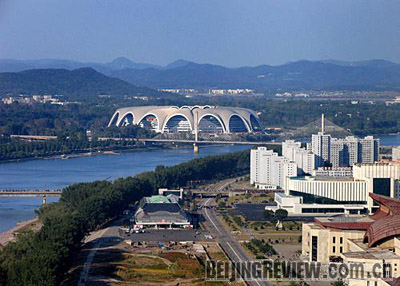|
|

|
|
A scene of pyongyang |
On July 24, North Korea signed the Treaty of Amity and Cooperation in Southeast Asia (TAC), marking the strengthened relations between North Korea and the Association of Southeast Asian Nations (ASEAN). The question now is, how much will North Korea participate in regional cooperation, and how will its neighbors respond?
North Korea's multi-faceted diplomacy
North Korea may be a fairly closed country, but it is not isolated if judging from an international angle. It sticks to an independent, peaceful and friendly diplomacy, while seeking to improve relations with other countries based on the principles of equality, independence, respect, non-intervention in internal affairs and mutual benefit.
There are three main threads of North Korea's diplomatic activities. The first is ties with countries that have traditionally had relations with North Korea, the second is relations with developing countries, and the third is relations with international organizations. In 1975, North Korea joined the Group of 77, a loose coalition formed by developing countries in 1964, and in the same year became a member of the Non-Aligned Movement, an international organization established in 1961 whose members claimed neutrality in the Cold War. After the Cold War, the world acknowledged the existence of a split Korean Peninsula and in 1991 granted membership in the United Nations to South Korea, or the Republic of Korea, and North Korea, or the Democratic People's Republic of Korea. Thus, North Korea became a normal member of international society.
But the reconciliation of East Asia never completely finished. While China, Russia and South Korea had normalized their diplomatic relations, the nuclear issue kept North Korea from fully restoring ties with the United States and Japan. Its relationship with South Korea did not go smoothly either.
Thus, North Korea's top diplomatic mission is to make breakthroughs in its relations with South Korea and the United States. On October 21, 1994, the United States and North Korea signed a framework agreement on freezing North Korea's nuclear facilities. Kim Il Sung's sudden death that year, however, slowed progress in the U.S.-North Korean relationship. In 2000, North Korea and the United States made progress on solving the missile crisis between them, a prelude to future breakthroughs in their relationship. Under these circumstances, North Korea's new leader Kim Jong Il proposed "new thoughts" for the new century, which covered both domestic reform and diplomatic relations. In 2000, North Korea achieved a diplomatic milestone by developing ties with Europe. In addition, North Korea began to merge into East Asia by attending the ASEAN Regional Forum that year.
East Asia has seen remarkable changes in recent years. The establishment of the East Asia Summit and signing of the ASEAN Charter indicate that regional cooperation will continue to grow wider and deeper. In 2008, North Korea submitted its nuclear facility list and exploded its nuclear reactor cooling tower in Yongbyon, a sign that the nuclear issue is heading toward resolution. Most recently, by signing the TAC North Korea has begun to pave the way for diplomatic normalization.
By using multilateral diplomacy, North Korea does not just seek a bigger role on the international stage. To North Korea, Washington's "hostile" policy is the biggest threat to its plan for a larger international role. Therefore, North Korea insists that the United States remove it from the list of countries that support terrorism, and then further lift economic sanctions. But North Korea doesn't have many political chips with which to bargain with the United States. Relying on multilateral diplomacy can help North Korea protect its political and economic interests.
|
